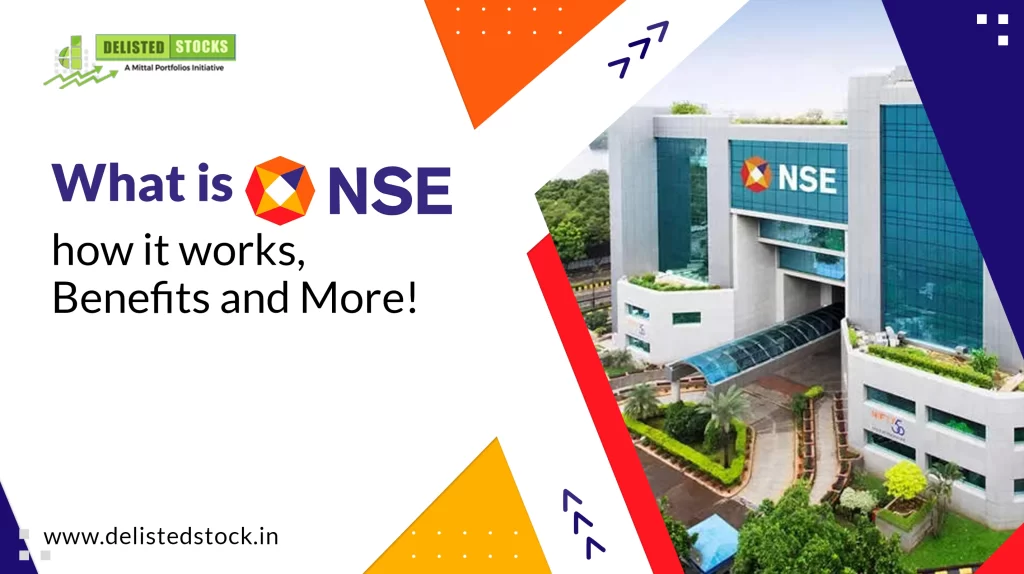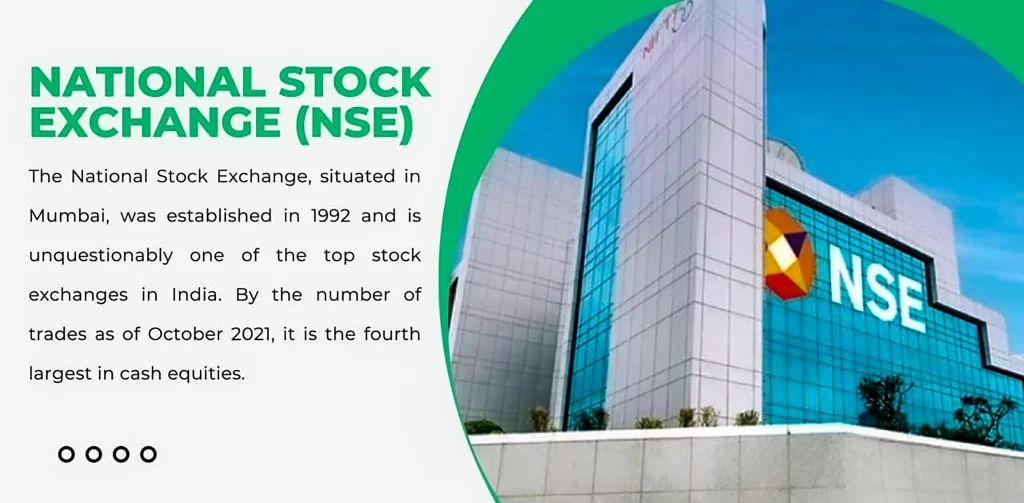21 Jan, 2023, Blog
Author: Delisted Stocks Team
21 Jan, 2023, Blog
Author: Delisted Stocks Team


The largest stock exchange in the country, the National Stock Exchange of India Limited (NSE), was formed in 1992 by the Indian government to develop solutions for simplifying stock market participation and making it more accessible to all interested parties. The NSE India is the country’s first completely automated electronic trading exchange. The National Stock Exchange of India Limited provides firms with a place to raise funds. On the platform, investors may trade stocks, currencies, debt, and mutual fund units. In this article, we deep dive into what NSE is and its functions. NSE's sustained leadership positions across asset classes in the Indian and global exchange sectors demonstrates the robustness and liquidity of our exchange. NSE has been playing the role of a catalytic agent in reforming the market in terms of microstructure and market practices. Right from its inception, the exchange has adopted the purest form of demutualised set up whereby the ownership, management and trading rights are in the hands of three different sets of people. Despite its late entry, the NSE garnered market share quickly due to various reasons:
NSE offers various services to its clients worldwide; such as Listing, trading, clearing & settlement, Indices, data feeds and technology. NSE had certain conceptions and believes that technology will continue to provide the necessary impetus for the organisation to retain its competitive edge and thus ensure timeliness and satisfaction in providing services to its clients. NSE stresses on innovation and sustained investment in technology to remain ahead of competition. NSE's IT set-up is the largest by any company in India. It uses satellite communication technology to energise participation from around 200 cities spread all over the country. In the recent past, capacity enhancement measures were taken up in regard to the trading systems so as to effectively meet the requirements of increased users and associated trading loads. With upgradation of trading hardware, NSE today can handle up to 15 million trades per day in any Capital Market segment. In order to capitalize on in-house expertise in technology, NSE set up a separate company, NSE InfoTech Services Ltd. which provides a platform for taking up all IT related assignments of NSE. The Exchange started providing trading in retail debt of Government Securities in January 2003. During the year 2007-08, it accounted for over 90 % of total trading value (debt, derivatives and equity) in the stock exchanges and 69% in equities and more than 98% in derivatives. Within a short span of time, the above objectives have been realized and the Exchange has played a leading role as a change agent in transforming the Indian Capital Markets to its present form. NSE has set up infrastructure that serves as a role model for the securities industry in terms of trading systems, clearing and settlement practices and procedures. The standards set by NSE in terms of market practices, products, technology and service standards have become industry benchmarks and are being replicated by other market participants. It provides screen-based automated trading systems with a high degree of transparency and equal access to investors irrespective of geographical location. The high level of information dissemination through on-line systems has helped in integrating retail investors on a nation-wide basis.  Trading: NSE shares are currently traded at INR 1,750 apiece in the unlisted market compared with INR 900-1000 in September last year. NSE holds nearly a monopoly in equity trades with 92% market share in the cash market and nearly 100% in the derivatives segment. At the current price in the unlisted market, NSE is valued at INR 87,000 crore. Moreover, NSE has seen its valuations surge 80% in the prior six months’ period as investors begin to factor in strong growth amid strong retail trading volumes and returns from IPOs last year. NSE shares in the unlisted market rallied sharply over the last six to eight months following excellent numbers the stock exchange has reported in the last few quarters. This has completely eliminated any conflict of interest and helped NSE to aggressively pursue policies and practices within a public interest framework. It has helped in shifting the trading platform from the trading hall in the premises of the exchange to the computer terminals at the premises of the trading members located country-wide and subsequently to the personal computers in the homes of investors. Settlement risks have been eliminated with NSE’s innovative endeavours in the area of clearing and settlement viz., reduction of settlement cycle, professionalization of the trading members, fine-tuned risk management system, dematerialisation and electronic transfer of securities and establishment of clearing corporation. As a consequence, the market today uses the state-of-art information technology to provide an efficient and transparent trading, clearing and settlement mechanism. NSE provides a trading platform for all types of securities-equity and debt, corporate government and derivatives. On its recognition as a stock exchange under the Securities Contracts (Regulation) Act, 1956 in April 1993, it commenced operations in the Wholesale Debt Market segment in June 1994, in the Capital Market segment in November 1994, in Futures & Options segment in June 2000 and in Currency Derivative segment in August 2008.
Trading: NSE shares are currently traded at INR 1,750 apiece in the unlisted market compared with INR 900-1000 in September last year. NSE holds nearly a monopoly in equity trades with 92% market share in the cash market and nearly 100% in the derivatives segment. At the current price in the unlisted market, NSE is valued at INR 87,000 crore. Moreover, NSE has seen its valuations surge 80% in the prior six months’ period as investors begin to factor in strong growth amid strong retail trading volumes and returns from IPOs last year. NSE shares in the unlisted market rallied sharply over the last six to eight months following excellent numbers the stock exchange has reported in the last few quarters. This has completely eliminated any conflict of interest and helped NSE to aggressively pursue policies and practices within a public interest framework. It has helped in shifting the trading platform from the trading hall in the premises of the exchange to the computer terminals at the premises of the trading members located country-wide and subsequently to the personal computers in the homes of investors. Settlement risks have been eliminated with NSE’s innovative endeavours in the area of clearing and settlement viz., reduction of settlement cycle, professionalization of the trading members, fine-tuned risk management system, dematerialisation and electronic transfer of securities and establishment of clearing corporation. As a consequence, the market today uses the state-of-art information technology to provide an efficient and transparent trading, clearing and settlement mechanism. NSE provides a trading platform for all types of securities-equity and debt, corporate government and derivatives. On its recognition as a stock exchange under the Securities Contracts (Regulation) Act, 1956 in April 1993, it commenced operations in the Wholesale Debt Market segment in June 1994, in the Capital Market segment in November 1994, in Futures & Options segment in June 2000 and in Currency Derivative segment in August 2008.  NSEs Capital Market segment offers a fully automated screen based trading system, known as the National Exchange for Automated Trading (NEAT) system, which operates on a strict price/time priority. It enables members from across the country to trade simultaneously with enormous ease and efficiency. NSEs Futures & Options segment provides trading of a wide range of derivatives like Index Futures, Index Options, Stock Options and Stock Futures. NSE provides a trading facility where investors can trade debt, equity and other assets classes from all across the country.
NSEs Capital Market segment offers a fully automated screen based trading system, known as the National Exchange for Automated Trading (NEAT) system, which operates on a strict price/time priority. It enables members from across the country to trade simultaneously with enormous ease and efficiency. NSEs Futures & Options segment provides trading of a wide range of derivatives like Index Futures, Index Options, Stock Options and Stock Futures. NSE provides a trading facility where investors can trade debt, equity and other assets classes from all across the country.